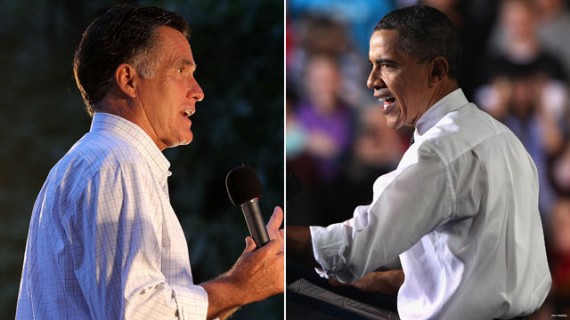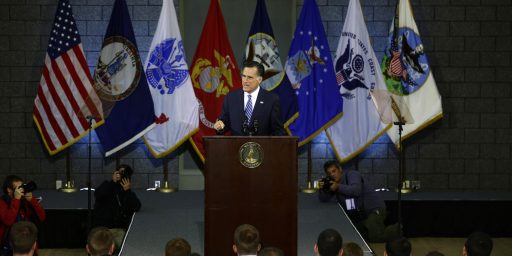Obama And Romney: A Dime’s Worth Of Difference On Foreign Policy?
Despite their rhetoric, there would be few differences between a Romney Administration and an Obama Administration when it comes to foreign policy.
Responding in part to my post from last week wondering whether it really mattered who won in November, Andrew Sullivan says the following:
[F]or me, this is first and foremost a foreign policy election. If Romney is elected, and if no deal with Iran is accomplished before then, we will go to war in a third Muslim country, and possibly escalate again in Afghanistan. The rebooting of the global religious war would be instant. The US will almost certainly become the guarantor of all of Greater Israel, rendering us cut off from the entire Arab and Muslim world, as well as increasingly isolated from Europe. Russia, Romney tells us, is the number one “threat”. Torture could well return.
It is the return to global polarization, confrontation and war that concerns me above everything else. The calming of international relations, the slow reintegration of the US with the global community, the slow strategy with Iran, the quiet rebuilding of alliances in the Pacific: all these are now white noise. But if they collapse, war and terror will return as the polarizing norm.
It’s an understandable argument, I suppose. By the end of the Bush Administration the position of the United States as a diplomatic actor had been seriously downgraded. However, it’s fair to say that this was almost entirely because of worldwide reaction to the Iraq War along with the allegations of torture in connection with the War On Terror. By the time Barack Obama became President, the Iraq War was, if not completely over, at least at a point where the end was in sight. The controversial aspects of the Bush Administration torture regime had ended years before Barack Obama even thought about becoming President.
The real question is whether there has actually been a substantive change in American foreign policy as it was when George W. Bush left office, and now.
I would submit that the answer is no.
James Joyner pointed out the similarities between the Bush and Obama foreign policy agendas just six months into Obama’s first term:
Through some combination of political calculation and genuine misunderstanding, Obama campaigned against a caricature of Bush’s foreign policy. Early in Bush’s second term, he began quietly shifting away from the so-called neoconservatives, and the realists resumed their dominance. Paul Wolfowitz went off to the World Bank in 2005. Doug Feith left that same year. After the November 2006 midterm debacle, Don Rumsfeld was allowed to ride off into the sunset, too. Pragmatic realists Condoleezza Rice and Bob Gates came into ascendency and quietly changed the administration’s focus. Obama has surrounded himself with pragmatic realists, too, so it’s not all that surprising that he’s carrying on the same basic strategy.
More importantly, however, despite the frenzy over personalities that we frequently find ourselves caught up in, the fact of the matter is that, like Bush before him, Obama is the American president. While different occupants of the Oval Office naturally have different instincts and emphases, their country has the same interests regardless of who’s filling the big chair. Likewise, we seem to constantly forget, the countries with whom we deal have continuing interests.
The subsequent 33 months have, I would submit, shown that this assessment is largely correct. Yes, President Obama has ended our military presence in Iraq (largely by adhering to a Status of Forces Agreement negotiated by the Bush Administration) but beyond that the actual substantive changes in American foreign policy have been quite minimal indeed. Go back and read James’s article from July 2009 and you’ll see that the differences between Bush 43’s second term and Obama’s first aren’t nearly as radical as either Republicans or Democrats would like to believe they are. Yes, perhaps there is a stylistic difference, and Secretary of State Clinton has certainly played an important role in the the process, but when it comes to the actual substance of their respective foreign policies, the differences between Barack Obama and George W. Bush can be measured in millimeters, not miles.
So, what does that tell us about the foreign policy debate between Barack Obama and Mitt Romney?
I would submit that it tells us that the most likely outcome of a Romney victory in November would be, for the most part, continuity rather than radical change. Granted, there are concerns to be drawn from the rhetoric that Romney engaged in during the primary campaign regarding foreign policy issues, and which he is likely to continue to push during the General Election campaign. Leaving aside that rhetoric, though, the mainstream of American foreign policy seems to me to be really well set. Unless Mitt Romney does something totally insane like making John Bolton Secretary of State (which I would submit is about as likely as Rick Santorum being selected as the next spokesperson for GLAAD), a Romney Administration’s foreign policy is likely to be not all that different from what we’ve seen over the past three years. Which, to be all that honest, hasn’t been all that impressive.
Sullivan’s big concern seems to be Iran. It’s mine too, and frankly it should be anyone’s. If there’s any place in the world where a war is likely to erupt within the next several years, it’s Iran. I agree that much of the rhetoric from the right regarding Iran, nuclear weapons, has been disturbing if not worse, it strikes me that a dose of reality it needed here too. Leaving aside the ideological points he continues to score with his rhetoric regarding Iran, it’s worth noting that Romney is not privy to the intelligence briefings that the President receives, nor the advice of the nation’s top military commanders. Assuming he’s elected President, one of the first things that will happen will be a full intelligence briefing. When that happened to Barack Obama in November 2008, several commentators noted that he seemed suddenly subdued and that his comments about foreign policy began to take on a new light. That would be called the light of reality. If he’s elected President, Mitt Romney will see that light too, and we’ll find that things won’t change nearly as much as some people fear.







Who knows what Romney’s policy on anything is? I don’t like Obama’s foreign policy but my fear is that Romney would be a captive of the neocons like GWB.
there is one significant difference: I believe that Romney would Most Favored Nation status to the Cayman Islands, and Obama would grant that to Hawaii, Indonesia or Kenya.
Certainly Romney won’t run around the world apologizing for the US.
What a pile of tripe. Sullivan’s right. You’re wrong.
George shifted away from the neo-cons in his last couple years, however, Romney has been embracing them.
http://www.boston.com/Boston/politicalintelligence/2011/09/romney-says-cheney-has-qualities-would-seek-vice-president-candidate/Qmay6ZCKABZeKrUrdidhFI/index.html
Romney calls Dick Cheney “a man of wisdom and judgement” AFTER Iraq. George, on the other hand, made sure Dick started losing arguments in the White House for a change. Hung Libby around his neck as an albatross by refusing to pardon him as well.
There’s a lot of wishful thinking in this post…it would be much more credible to think that Romney would tone down the rhetoric and base his foreign policy on reality rather than bellicose saber rattling if he wasn’t being advised by the same neocon fools who got us into Iraq…of course, that line of thought would go against Doug’s favorite “they’re all the same” meme…
U.S. foreign policy has been adrift since the end of the Cold War, without a strategy outlining realistic political objectives.The Clinton, Bush and Obama administrations have hyperfocused on each engagement as if they were entirely isolated from everything else. I expect the reactionary thinking and reflexive lashing out of the washed-up American Empire to continue as its decline accelerates. Neither Romney nor Obama are capable of doing otherwise.
The basic premise…that there isn’t much difference between Bush and Obama…is so wrong that you should resign in embarrassment.
9.11 happened on Bush’s watch. What’s the comparable event?
Bush ignored Afghanistan soon after invading and for most of his two terms. What theater is Obama ignoring?
Bush institutionalized torture. Obama?
Bush attacked and occupied another nation with little International support. What’s the comparison? Libya? Give me a break.
Bush failed to bring OBL to justice. Obama sent Seals to kill that bastard.
Seriously…No difference?
Are you kidding?
@Hey Norm: There’s a difference (though americans no longer seem to acknowledge it) between tactical successes in national security and real foreign policy.
Andrew Sullivan still is blogging??
That aside, I suspect the differences between Obama and Romney on foreign policies would be more akin to a half-dollar than to a dime.
First off, the definite similarities: Certainly Romney would continue unabated Obama’s policy of incinerating al Qaeda terrorists overseas by firing missiles at them and by dropping bombs on them. Obviously Romney also would keep open for business Gitmo and the military tribunals. All good things.
On the other hand, a Romney administration almost certainly would take a different approach in Afghanistan, I suspect they would negotiate permanent bases there, as opposed to searching for a particular deadline by which to cut and run.
A Romney administration without doubt would have a different approach to fast-tracking free trade agreements. Of course Team Romney wouldn’t give Kyoto or similar accords the time of day.
Assuming Israel doesn’t preemptively attack Iran before this year’s election, then it’s certainly possible, albeit not guaranteed, that a Romney administration would result in a far different approach than sanctions alone. Specifically bombs and missiles.
Speaking of Israel, relations with that country would thaw the instant Romney would become president-elect, much less after he would take over the following January.
I think China could be handled a lot differently, i.e., more aggressively, by Team Romney, and that would be a major concern of mine. We don’t need a trade war with China. China’s currency is not a boogeyman. If we want to export more goods we should strike additional free trade pacts.
Missile defense in Eastern Europe likely would re-commence under a Romney administration, as opposed to effectively having been scuttled by Team Obama. That’s a significant issue. Especially to Eastern Europeans and to Putin & Co.
Team Obama doesn’t have a coherent policy for dealing with North Korea, so pretty much anything that Team Romney would attempt would be a significant change.
Our national debt in essence is a de facto foreign policy issue, especially given the reality that China is our largest creditor and they’re not exactly the most benign government on the block. If Romney fires Bernanke (as he should) and pursues federal spending austerity (as he should) and takes steps to grow the economy with tax and regulatory reforms (as he should) there’s at least a fighting chance that we somewhat could rein in the national debt during his presidency. Subject, of course, to Congressional Democrats getting in touch with their inner George Mitchells and their inner Tom Daschles.
Team Romney wouldn’t win the Nobel Peace Price. On that we can be as certain as death and taxes.
Lastly, relations with Mexico would be far different. Team Romney wouldn’t send over the border untracked and unchecked assault rifles with which local criminals could murder Mexican citizens.
@ Ben…
So you want to write Iraq off as a tactical matter???
Wars of choice are Foreign Policy.
@ Ben…
Iraq was a real Foreign Policy blunder. Arguably the worst in our history.
To write that off as “a dimes worth of difference” borders on dimentia.
@Hey Norm: The invasion of Iraq was a tactical decision in service to the Bush Administration’s “strategy” of reforming the Arab world via American military power. But a strategy conceived around unattainable objectives is not a strategy, it’s an abdication of strategy. Withdrawing from Iraq was also a tactical decision.
The Obama Administration has no strategy either. No political objectives to work toward which will bring us to the end of our endless war. Targeted assassination? A tactic, the replacement for counterinsurgency. Our military buildup in the Pacific? A tactic against the Chinese, in service to no greater purpose.
Obama is fighting and winning some battls, but he’s doing nothing to win the war. That’s not a fault unique to him, it’s the direction we’ve been headed for decades and reflects the orthodox inside-the-beltway thinking on these issues. Romney wouldn’t do any better, both because of the tremendous inertia behind our institutions and his tendency to just go with whatever he thinks other people want.
http://www.youtube.com/watch?v=Qk6CQVvMtNU
The old McCain beat-down of Mitt on waterboarding.
Torture is of course not foreign policy, but what does it say about Mitts views of people who are not like us?
The same dumbasses giving Romney his current thoughts on foreign policy are the same dumbasses that are going to get hired by Romney.
Let’s not pretend like Romney’s hiring bench isn’t going to be from a bunch of bush retreads. You can have all the intelligence reports in the world, but that doesn’t magically make you competent. The Bush admin should have taught us this.
@ Ben…
Sure…you can keep zooming out as far as you want.
Ultimately you get to “World Peace” and every single thing is a tactic in the service of that strategy.
Obama is also for “World Peace”. OMG…they’re the same!!!
Iraq was POLICY that Neocons were pushing before Bush.
Bush invaded and occupied another nation for no reason.
I’m sorry…saying Bush and Obama are the same is insanity.
Oh please…as if “cutting and running” is a bad thing…
Umm, neither has Team Obama…
The top foreign policy reason to completely reject a Romney presidency…
For someone who rejects the legalization of drugs, you certainly do write as though you are taking many of those drugs…
Doug, you don’t believe this. You wrote this just to gin up controversy. Well played, sir, but I’m not biting on this hook!
@ Dazed…
How is violating the Geneva Convention as a matter of POLICY not Foreign Policy.
Interesting. Several contributors here at OTB argued strenuously that Obama was the proper choice just because he would handle foreign affairs differently. But now that Obama is in essence indistinguishable from Bush, we should think that because Romney might not be so different we ought to re-elect Obama?
Very curious Doug.
@Hey Norm:
Rhetorical question, right?
@Hey Norm: Iraq was a real Foreign Policy blunder. Arguably the worst in our history.
People who’ve actually heard about the Vietnam War, the Bay of Pigs, and several other far worse “blunders” would beg to differ.
I am curious, however, about Romney’s position vis-a-vis the Argentine/British dispute over the Maldives…
Jenos…
Too bad about your reading comprehension problem.
I’m sure professional help is available.
You must only overcome the Dunning-Kruger effect so that you are able to recognize your problem.
@ Jenos…
I am curious though…
What do you consider to be several other worse foreign policy blunders?
@Jenos Idanian:
Pretty sure you mean the Malvines, which is the Spanish name for the Falklands.
The Maldives are in the Indian Ocean 🙂
@Jenos Idanian:
In terms of dollars wasted, lives lost, strategic blundering and duration – I’d say that the second Iraq War was a bigger blunder than the Bay of Pigs.
Since when is it either fair or appropriate to simply flush the first 6 years of foreign policy during the Bush II Administration down the memory hole?
Mike
@Tsar Nicholas:
I actually agree with a lot of this. Two exceptions:
I submit there’s no such thing as a coherent NK policy, so Romney won’t have one either. It’s a dog’s dinner.
China is our largest foreign creditor, holding about $6.3 trillion. The US government itself holds slightly more.
@ Mike…
If there is one thing that charachterizes Republicans today it is this very sort of collective amnesia. It’s also not limited to foeign policy. There really is no other way to explain the hubris with which they operate on a daily basis. If I were responsible for the level of damage they created in 8 years I would be tempted to fall on a sword in the tradition of the Japanese. And yet these folks strut around claiming to have all the answers. And the ridiculous thing is that their answers are the very same ones that caused all the damage. They don’t have new ideas. They haven’t changed their views based on experience. They want to double-down on stupid.
It’s unbelievable to me.
@Doug Mataconis: Sorry, got confused with Obama’s latest (and inept) dig at the British…
@Hey Norm: why are wingnuts so damn stupid? No one runs around apologizing for America. Too bad stupid people get the vote.
@MBunge: The entire Cheney/Bush years have been flushed down the memory hole. wingnuts are very good at forgetting things they don’t want to remember. To them we went from Clinton to Obama. The years 2000-2008 don’t exist for them. They are very stupid people.
A lot of people said roughly the same thing when GW was elected.
Those who refuse to learn from history are doomed to repeat it.
Just as we had our first inkling that the Bush the Younger Administration was going to be a disaster on foreign affairs when they seemed undeterable in their desire to bring back from the political graveyard people like Elliott Abrams and John Poindexter whose prior years in government should have made them radioactive, Romney seems determined to go down the same path by bringing in retreads like Dan Senor and war cheerleaders like Robert Kagan, whose string of supporting disasters is unbroken.
I think there would be differences, but certainly less difference than rhetoric alone would suggest.
Generally speaking, our foreign policy will remain aggressively interventionist (you say neocon, I say liberal interventionist, potato, potato, tomato, tomato…). There would likely be differences as to exactly where we intervene and the level of intevention, though, and those things matter. A lot. So far, Romney has been running around saying some pretty irresponsible things. His likely advisors have poor track records.
As for the whole worst FP disaster thing… I don’t see how you can put Iraq ahead of Vietnam. I’d probably put it in the 2 spot, though, and that’s pretty bad.
Daniel Larison says it better than I did:
http://www.theamericanconservative.com/larison/2012/04/17/would-romneys-foreign-policy-be-significantly-different/
Moosebreath has it.
Romney’s advisers are by and large the same folks who plotted the Iraq cakewalk. Sure, as long as Romney gets to be president, he doesn’t really care whether he has Eliot Cohen or Dennis Kucinich making decisions about Iran policy. But it’s Cohen, and Robert Kagan, he has as advisers.
In order to argue that his foreign policy would be Obama-like, you have to argue that, as president, Romney would appoint people like Hillary Clinton to important foreign policy positions. But he’s got Bushian rhetoric and Bushian advisers.
For all the continuity between Bush and Obama, you’ll note a reduction in the unprovoked invasions of foreign countries under the latter. The folks being heard & making decisions in a Romney administration would be working to revert to Bush Jr.’s policies on that front. (And on torture).